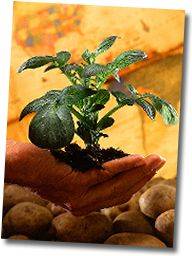The nutrients in fertilizers and manures that give us the
lush, quick growth we want in our vegetable gardens may also contribute to
pollution problems. If we apply nutrients at the wrong time or incorrectly, they
can move through the soil by leaching, erode with surface soil, or wash into
storm drains in heavy rains, polluting our groundwater, streams, lakes, and
ultimately, the ocean.
Fertilizers are derived from either chemical or organic
sources and may be purchased in many different formulations. Composts and
manures can be used as fertilizers and soil amendments. Most organic fertilizers
contain small amounts of nutrients that are released to the soil over an
extended time. The major benefit of adding these organic materials is in
improving the soil structure, allowing it to drain better, and, at the same
time, hold nutrients longer. Mulches such as straw, wood chips, and pine needles
can hold nutrients longer as well as slow down the movement of water, reducing
erosion
Your responsibility in using fertilizers safely and
effectively results in a healthier lawn and better water quality. Remember when
you take care of the environment, the environment will take care of you and your
surrounding world!
Few topics on the left column deals with
different issues about the uses of fertilizers in the garden.
![]() Gardeners' Corner
Kids'
Garden
Sustainable Garden
Contact Us
Gardeners' Corner
Kids'
Garden
Sustainable Garden
Contact Us![]()


